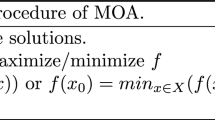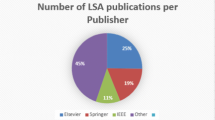Abstract
This paper deals with the Flooding Problem on graphs. This problem consists in finding the shortest sequence of flooding moves that turns a colored graph into a monochromatic one. The problem has applications in some areas as disease propagation, for example. Three metaheuristics versions are proposed and compared with the literature results. A new integer programming formulation is also proposed and tested with the only formulation known. The obtained results indicate that both the proposed formulation and the Evolutionary Algorithm are, respectively, the best exact and heuristic approaches for the problem.




Similar content being viewed by others
References
Adriaen, M., De Causmaecker, P., Demeester, P., & Vanden Berghe, G. (2004). Spatial simulation model for infectious viral disease with focus on SARS and the common flu. In 37th annual Hawaii international conference on system sciences. IEEE Computer Society. ISBN: 0-7695-2056-1.
Aiex, R. M., Resende, M. G. C., & Ribeiro, C. C. (2002). Probability distribution of solution time in GRASP: An experimental investigation. Journal of Heuristics, 8, 343–373.
Barone, P., Bonizzoni, P., Vedova, G. D., & Mauri, G. (2001). An approximation algorithm for the shortest common supersequence problem: An experimental analysis. In ACM symposium on applied computing (pp. 56–60).
Barros, B. J. S., Pinheiro, R. G. S., & Souza, U. S. (2015). Métodos heurísticos e exatos para o Problema de Inundação em Grafos. In Anais do XLVII Simpósio Brasileiro de Pesquisa Operacional (SBPO2015), Salvador/Brasil.
Clifford, R., Jalsenius, M., Montanaro, A., & Sach, B. (2012). The complexity of flood filling game. Theory of Computing Systems, 50, 72–92. https://doi.org/10.1007/s00224-011-9339-2.
Contreras, I., Tanash, M., & Vidyarthi, N. (2016). Exact and heuristic approaches for the cycle hub location problem. Annals of Operations Research, 1–23. https://doi.org/10.1007/s10479-015-2091-2.
da Fonseca, G. H. G., Santos, H. G., Toffolo, T. A. M., Brito, S. S., & Souza, M. J. F. (2016). GOAL solver: A hybrid local search based solver for high school timetabling. Annals of Operations Research, 239(1), 77–97. https://doi.org/10.1007/s10479-014-1685-4.
da Silva, C. T. L., Arenales, M. N., & Silveira, R. (2007). Métodos tipo dual simplex para problemas de otimização linear canalizados e esparsos. Pesquisa Operacional, 27, 457–486. https://doi.org/10.1590/S0101-74382007000300004.
Davis, T., Rajamanickam, S., & Sid-Lakhdar, W. (2016). A survey of direct methods for sparse linear systems. Acta Numerica, 25, 383–566. https://doi.org/10.1017/S0962492916000076.
Feo, T. A., & Resende, M. G. C. (1995). Greedy randomized adaptive search procedures. Journal of Global Optimization, 6, 109–133.
Festa, P., & Resende, M. G. C. (2002). GRASP: An annotated bibliography. In C. C. Ribeiro & P. Hansen (Eds.), Essays and surveys on metaheuristics (pp. 325–367). Boston: Kluwer Academic Publishers.
Fleischer, R., & Woeginger, G. J. (2010). An algorithmic analysis of the Honey-Bee game. In P. Boldi, & L. Gargano (Eds.), FUN. Lecture notes in computer science (Vol. 6099, pp. 178-189). Berlin: Springer. ISBN: 978-3-642-13121-9.
Goldberg, D. E. (1989). Genetic algorithms in search, optimization and machine learning. Boston, MA: Addison-Wesley Longman Publishing Co. Inc.
Gonçalves, J. F., Resende, M. G. C., & Costa, M. D. (2016). A biased random-key genetic algorithm for the minimization of open stacks problem. International Transactions in Operational Research, 23, 25–46.
Holland, J. H. (1975). Adaptation in natural and artificial systems. Ann Arbor: University of Michigan Press.
LabPixies. (2015). Labpixies—The coolest games! Avaiable at http://www.labpixies.com. Access on 04/27/2015.
Lagoutte, A., & Tavenas, S. (2013). The complexity of shortest common supersequence for inputs with no identical consecutive letters. arXiv:1309.0422 [cs.DM].
Lagoutte, A., Noual, M., & Thierry, E. (2014). Flooding games on graphs. Discrete Applied Mathematics, 164(2), 532–538.
López-Ibáñez, M., Dubois-Lacoste, J., Cáceres, L. P., Stützle, T., & Birattari, M. (2016). The irace package: Iterated racing for automatic algorithm configuration. Operations Research Perspectives, 3, 43–58.
Lourenço, H. R., Martin, O. C., & Stutzle, T. (2003). Iterated local search. In F. Glover & G. A. Kochenberger (Eds.), Handbook of metaheuristics (pp. 321–353). Norwell: Kluwer Academic Publishers.
Meeks, K., & Scott, A. (2011). The complexity of flood-filling games on graphs. Discrete Applied Mathematics, 160, 959–969. https://doi.org/10.1016/j.dam.2011.09.001.
Meeks, K., & Scott, A. (2013). The complexity of free-flood-it on \(2\times n\) boards. Theoretical Computer Science, 500, 25–43. https://doi.org/10.1016/j.tcs.2013.06.010.
Penna, P. H. V., Subramanian, A., & Ochi, L. S. (2013). An iterated local search heuristic for the heterogeneous fleet vehicle routing problem. Journal of Heuristics, 19(2), 201–232. https://doi.org/10.1007/s10732-011-9186-y.
Rahmann, S. (2003). The shortest common supersequence problem in a microarray production setting. Bioinformatics, 19(2), 156–161.
Sabar, N. R., & Kendall, G. (2015). An iterated local search with multiple perturbation operators and time varying perturbation strength for the aircraft landing problem. Omega, 56(Supplement C), 88–98. https://doi.org/10.1016/j.omega.2015.03.007.
Silva, A. R. V., & Ochi, L. S. (2010). Hybrid heuristics for dynamic resource-constrained project scheduling problem. In Hybrid metaheuristics: 7th international workshop, HM 2010, Vienna, Austria (pp. 73–87). https://doi.org/10.1007/978-3-642-16054-7-6.
Silva, A. R. V., & Ochi, L. S. (2016). An efficient hybrid algorithm for the traveling car renter problem. Expert Systems with Applications, 64, 132–140. https://doi.org/10.1016/j.eswa.2016.07.038.
Sim, J., & Park, K. (2003). The consensus string problem for a metric is NP-complete. Journal of Discrete Algorithms, 1(1), 111–117.
Souza, U. S., Protti, F., & Dantas da Silva, M. (2014). An algorithmic analysis of flood-it and free-flood-it on graph powers. Discrete Mathematics and Theoretical Computer Science, 16, 279–290.
Souza, U. S., Protti, F., & Silva, M. D. (2013). Parameterized complexity of flood-filling games on trees. In D. Z. Du & G. Zhang (Eds.), Computing and Combinatorics. COCOON 2013. Lecture Notes in Computer Science (Vol. 7936). Berlin: Springer. https://link.springer.com/chapter/10.1007/978-3-642-38768-5_47.
Stefanello, F., Buriol, L. S., Hirsch, M. J., Pardalos, P. M., Querido, T., Resende, M. G. C., et al. (2017). On the minimization of traffic congestion in road networks with tolls. Annals of Operations Research, 249(1), 119–139. https://doi.org/10.1007/s10479-015-1800-1.
Yevseyeva, I., Basto-Fernandes, V., Ruano-Ordás, D., & Méendez, J. R. (2013). Optimising anti-spam filters with evolutionary algorithms. Expert Systems with Applications, 40(1), 4010–4021. https://doi.org/10.1016/j.eswa.2013.01.008.
Acknowledgements
We thank the partial support given by FAPERJ, CNPq and CAPES.
Author information
Authors and Affiliations
Corresponding author
Rights and permissions
About this article
Cite this article
da Silva, A.R.V., Ochi, L.S., Barros, B.J.d.S. et al. Efficient approaches for the Flooding Problem on graphs. Ann Oper Res 286, 33–54 (2020). https://doi.org/10.1007/s10479-018-2796-0
Published:
Issue Date:
DOI: https://doi.org/10.1007/s10479-018-2796-0




